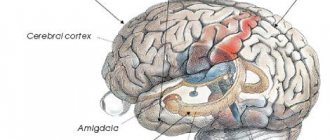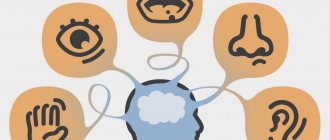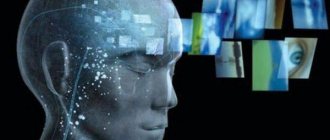Reasons for deterioration
There are many reasons for memory deterioration, but they are all divided into age-related changes, those reasons that are associated with brain damage, those that arise due to various diseases of other organs, the consequences of intoxication processes and those that arise due to external negative factors.
Causes associated with direct damage to the brain itself as a human organ include traumatic brain injury, acute circulatory disorders or stroke, and various oncological problems in this organ. External factors that adversely affect memory include insufficient sleep, various stresses, changes in living conditions, and increased brain load. Chronic intoxication processes that cause forgetfulness should be understood as conditions that are provoked in the human body by alcoholism, smoking, drug addiction, abuse of tranquilizers and other pharmacological drugs.
Human memory is directly dependent on various modalities. The modality can be visual, auditory, motor. Modalities can also be combined in different proportions with each other. This determines how it is easier for a particular person to remember information. Some people prefer to learn something by saying information out loud, others find it easier to remember what they read, others must see a page with text or graphics that contains the material. Different parts of the human brain are responsible for different memory-related functions. The sections in the temple area are responsible for the auditory perception of speech or sounds, the occipital-parietal zone is responsible for spatial and visual perception. In the left hemisphere, visual perception is focused on letters and objects, and in the right hemisphere, on optical-spatial, color and facial perceptions. The inferior parietal zone is responsible for the functionality of the hands and the speech apparatus, which, when damaged, leads to astereognosia, that is, the inability to identify an object by touch. Thus, we can conclude that it is precisely the type of memory that is disrupted that is characteristic of a certain affected area of the human brain.
Modern research has a lot of evidence regarding the theory that hormonal levels greatly affect the thought process and memory. These processes can be positively influenced by hormones such as testosterone, vasopressin, estrogen, and prolactin. Hormones contribute to the transformation of short-term memory into long-term memory, but not all. For example, oxytocin, on the contrary, significantly weakens the process of remembering information, causing forgetfulness in women during breastfeeding and after childbirth.
What is “Memory”?
Memory is a complex structured mechanism that allows people to perceive the information around us, process the received data and store it.
Each of us has this function from birth and has the opportunity to train and develop it.
Unfortunately, the opposite effect is also possible under the influence of various factors that can negatively affect attention and memory.
Attention is a directed emphasis on an action or event. This process is a similar cognitive phenomenon as memory.
What happens inside the brain
According to biologists, memory is the result of the functioning of a web of neural connections in which central nervous system reactions occur. A person perceives and perceives the objects around him through receptors: hearing, vision, smell, touch, taste. All information is transformed into electronic impulses that are sent to our brain. This is the final point where all collected information is stored.
We are able to remember even the smallest nuances or insignificant events if they are supported by one of the receptors. Memory is also unique in that a person is able to add various details to memories: “experienced” emotions, conclusions, and so on. In essence, we do not remember the actual event, but a slightly modified personal impression.
Where is the information stored?
Currently, scientists do not have answers to the specific question “Where and how is information stored in the human brain?” Many theories and assumptions have been put forward, but none of them have been confirmed.
In scientific circles, there is an opinion that the information received is stored in neural circuits.
Pathologies that impair memory
The most common diseases that significantly weaken the process of memorization are traumatic brain injuries. Deep and extensive injuries are more dangerous, since their severity is directly proportional to the process of memorization. With traumatic brain injuries in humans, retrograde and anterograde amnesia are common phenomena, characterized by forgetting not only the event in which the injury occurred, but also those that preceded or followed it. Also, traumatic brain injuries are characterized by the occurrence of hallucinations and confabulations. Hallucinations are understood as false events and images that could not happen in real life (naturally, they did not happen). Confabulations are false memories that the memory of a sick person brings up. Thus, when confabulations occur, the patient may, when asked about his actions in the past day, answer that he visited the theater, but in fact he was in the hospital ward because he was injured.
Memory deterioration very often occurs due to impaired blood circulation in the patient’s brain. With atherosclerotic vascular changes in the brain, blood flow to various parts of the brain decreases, which provokes a weakening of memory. In the modern world, atherosclerosis has ceased to be a disease of older people and is increasingly being diagnosed in a fairly young population. Atherosclerosis also provokes the development of acute circulatory disorders in the brain. This disease, known as a stroke, can affect various areas of the brain, cutting off blood flow to them partially or completely. The functionality of such zones is grossly disrupted, everything suffers, including memory.
Diabetes mellitus has similar effects on the processes of remembering information. A complication of diabetes mellitus can be angiopathy - a disease manifested in the thickening of vascular walls to the point where small vessels completely cease to function due to overlap, and large ones narrow significantly, slowing down blood flow. In this case, blood circulation is disrupted in every organ and system of the human body, including the brain. And any disturbance of blood circulation in the brain leads to impaired memory function.
If the memory function is impaired, we can conclude about the possible occurrence of diseases in the thyroid gland, which are characterized by an insufficient amount of hormones produced by it - hypothyroidism. Thyroid hormones contain up to 65% iodine. With this disease, along with memory deterioration, weight gain occurs, depression, swelling, apathy, irritability occur, and muscle tone becomes very weak. It is necessary to prevent iodine deficiency with an appropriate diet containing iodized salt, dairy products, sea fish, seaweed, nuts, persimmons, and hard cheeses.
The inflammatory process in the meninges (meningitis) and in the substance of the brain (encephalitis) significantly affects the functioning of the entire brain as a whole. The most common causes of encephalitis and meningitis are neurotropic viruses and bacteria. Therapy for these diseases is very successful if they are detected in a timely manner, but memory impairment may remain in a person as a consequence of the disease.
Degenerative brain diseases, such as Alzheimer's disease, are the least responsive to therapeutic methods. With this pathology, memory gradually but surely decreases, ultimately leading to a decrease in the patient’s intellectual abilities. The worst situation is when a person ceases to navigate in space and is unable to engage in self-care. Alzheimer's disease is common in older people after 70-80 years of age. It proceeds slowly, gradually, and in the initial stages is completely unnoticeable. Signs of pathology are decreased attention and memory failures. The patient begins to forget the last events that happened to him, and if you persistently ask about them, he will begin to replace them with memories from the past. All this leaves an imprint on the patient’s character, leading to increased selfishness, increased demands, capriciousness, and apathy.
If such diseases are not treated in a timely manner, a person ceases to navigate time and space, he does not know the current date, the place where he is, and does not understand what needs to be done when natural needs arise. Modern medicine considers Alzheimer's disease to be hereditary; in the absence of treatment, it progresses sharply at a certain point, however, if it is treated, its progression slows down and is quite mild.
However, memory deterioration is not always associated with brain damage; very often a person himself tries to forget troubles and fears, using psychological defense mechanisms, of which there are many. With the frequent use of these mechanisms, it may seem from the outside that a person suffers from memory disorders, but this is not the case. Such “forgotten” emotions and states have a bad effect on the nervous system, leading to aggressiveness, neuroses, and so on.
Ways to solve the problem
The best option is to visit a good neurologist. Such a specialist will help you find out the real reasons for loss of concentration and suggest ways to eliminate them. It is also possible to correct the situation on your own, but only on the condition that we are not talking about any disease - here you cannot do without a specialist.
To strengthen your memory and increase concentration you need to:
- Adhere to the correct daily routine.
- Eat well.
- Drink enough water.
- Spend as little time as possible at the computer, with gadgets or in front of the TV.
- Take medications that improve concentration and memory. For example, Esprico vitamins are considered one of the best, containing 2 types of Omega-3, Omega-6, magnesium and zinc (by the way, they are available in our online pharmacy).
- If possible, avoid alcohol, smoking or using drugs.
- Be sure to play sports!
- Be in the fresh air for at least 1.5-2 hours a day.
- Every day, learn poetry or a foreign language by heart, play logic games.
At the same time, certain “exercises” should be performed. So, you should try to do ordinary things in an unusual way. For example, walking backwards for a while (you can do it at home, when no one sees you), brushing your teeth and combing your hair with your left hand if you are right-handed (and vice versa), going to work on a different route, etc. All this will give a powerful an impetus for the formation of new neural connections.
And remember that it is much easier to prevent the problem with the same lifestyle adjustments and regular intake of vitamins than to get rid of its consequences.
Treatment of memory impairment
Memory impairment can be treated only after the cause of this process has been established. Medicines should be prescribed exclusively by doctors, as a rule, these are some nootropic drugs, such as:
- Glycine;
- Piracetam;
- Bilobil;
- Pantogam;
- Aminalon.
The course of treatment with these drugs is quite long, it is always reinforced by taking multivitamin complexes. Sometimes doctors prescribe physiotherapy to patients. In cases of memory loss, the electrophoresis procedure with intranasal administration of glutamic acid (preparations based on it) works effectively. Pedagogical and psychological correction techniques also effectively influence the restoration of memory when it declines - teachers teach patients to remember by training the unaffected functionality of the brain. If the patient is unable to remember words spoken out loud, he is taught to imagine a visual image of what was said, and then memorization becomes real. The complexity and duration of the learning process lies in the fact that it is important not only to teach a person to resort to intact connections and parallels of the brain, but also to bring this process to automaticity.
Best materials of the month
- Coronaviruses: SARS-CoV-2 (COVID-19)
- Antibiotics for the prevention and treatment of COVID-19: how effective are they?
- The most common "office" diseases
- Does vodka kill coronavirus?
- How to stay alive on our roads?
Memory deterioration reduces a person’s social skills and may indicate the development of other pathologies, being a poor prognostic symptom. Neurologists, neuropsychologists, and therapists treat pathologies associated with memory impairment. However, it is important to understand that very often when patients complain of memory impairment, they are actually suffering from deterioration in attention. This state of affairs is typical for schoolchildren and older people. This happens due to the underestimation of everyday information received by a person. Dealing with absent-mindedness and attention problems is difficult because people rarely realize that there is a problem, even if you tell them about it directly. The way out of this situation is to constantly work on your own perception of information - training attention and memory by recording information on paper, recording it in electronic devices, etc.
You can train the functioning of the brain using the American method of Professor Lawrence Katz, which promotes the activation of brain activity, the creation of new associative connections, involving various parts of the brain. The exercises of this technique include several practices. The specialist says that you should try to do your usual work with your eyes closed. Right-handed people are advised to start performing a number of everyday tasks (brushing their teeth, combing their hair, using a wristwatch) with their left hand, and left-handed people - vice versa. It is important to master at least the basics of sign language and Braille (writing and reading for people with visual impairments), and learn how to operate a computer keyboard using all 10 fingers. It is recommended to study any applied type of needlework from scratch in order to develop finger motor skills. By touch it is necessary to train to distinguish coins of different denominations. It is important to constantly learn something new and try to apply it to your own life - learn new languages, read articles on topics you don’t understand, meet different people, travel, discover new places. All these simple exercises perfectly train brain activity, and therefore memory, and therefore will ensure normal self-awareness for a long time.
How a neurologist treats memory
Before starting treatment, it is necessary to understand what disease caused the problem. Medicines should be used only those prescribed by your attending physician; self-medication is unacceptable. It is optimal to undergo a complete diagnosis of brain activity, vascular health, and electroneuromyography.
It should be remembered that rapid memory deterioration in itself is not a disease; this symptom only warns of the emergence of a more serious disease that needs to be diagnosed and therapeutic or radical treatment begun. This will help restore the previous quality of life, prevent the patient from separating from society and deteriorating adaptive functions. When memory impairment is detected, nootropic drugs are usually prescribed.
Features and types of memory loss
Memory loss is referred to by doctors as amnesia , and is a temporary or persistent inability of a person to remember events that happened in the distant or recent past.
It is not a real pathology, but only a syndrome that can affect a person of any age, but is most often observed in older people, in whom it is caused by progressive degeneration of brain cells.
Memory loss occurs when one or more functions performed by the limbic system of the brain are impaired. This part of the brain consists of the hippocampus, hypothalamus, amygdala and other parts that perform many mental functions such as emotions, smell, mood and memory.
Now let's see what types of memory loss there are.
Conclusion
A person can be forgetful at any age. It is important to distinguish between the characteristics of the human brain and the conditions for which treatment is needed. If the problem is simply a poorly developed memory, psychology recommends learning poetry, solving crossword puzzles, and using special memorization techniques.
If parents want to develop their child’s memory, they should learn a quatrain with him every day. Such activities are possible from the age of three. This is not only an excellent tool for improving memory, but also an incentive to develop thinking, speech, and a love of literature.
Types
The following types of memory are distinguished:
- Visual (visual). This is the most important type. It is he who helps in survival.
- Auditory. It is well developed among musicians.
- Verbal-logical. It is developed among politicians, philosophers, and people of intellectual work.
- Motor (motor). Athletes master it perfectly.
- Emotional. This type is the most durable. A person easily remembers those moments of his life that he experienced emotionally.
As psychologists have found out, an individual person has only one type developed. It is easier for some to remember what they wrote down, for others - what they saw.
There is also the concept of “human genetic memory”. It refers to hereditary reactions that one generation passes on to another through genes.
Athletes also have the concept of “muscle memory.” It refers to the restructuring of muscle fiber cells for a long time under the influence of uniform physical activity. Constant physical activity helps athletes quickly get into shape even after a fairly long break.
Diagnostics
To find out how to deal with absent-mindedness in your case, you need to visit an endocrinologist for a detailed medical history and obtain prescriptions for laboratory diagnostics. Research at the stage of visiting an endocrinologist includes tests, ultrasound diagnostics, and identification of predisposition to hereditary diseases. If a patient has chronic illnesses, he regularly faces stress, sleeps poorly, and absent-mindedness is not surprising. Sometimes additional studies may be required: ECG, encephalogram, etc.
Special exercises
"Rite"
The essence of the exercise is to get rid of bad memories in the form of a ritual. A person responds well to various psychological anchors created by psychotechnics.
- Option 1. Wash away memories by pouring water on yourself.
It is necessary to imagine a negative experience in the form of dirt or dust adhering to the body. In the process, the water washes away all this dirt, freeing the consciousness. If fantasy is developed well enough, the technique will help you completely get rid of worries about negative experiences. - Option 2. Burn your memories by first writing them down on a piece of paper. It is better to describe the event or situation in as much detail as possible in order to draw the emotions out. Then it will be easier to remove them thanks to the visual sequence of human actions.
- Option 3. You can bury memories if there is something associated with a negative event. In this case, you can arrange an impromptu funeral for this thing, mentally connecting and burying all negative emotions with it.
"Perception"
You need to remember the events as a fragment from a film , i.e. watching him from the side.
Now you can start:
- scroll through the situation in your head, trying on the role of each participant in the event;
- scroll through the situation in your head as if you were looking at what is happening through a TV screen, changing the playback speed from minimum to maximum;
- “color” the picture, observing it in green, red, blue;
- Zoom in and out of people participating in dialogues.
All this will help reduce the significance of the event and the individual people involved in the situation.
Consequences
If the situation is neglected, the following consequences may occur:
- developing dementia;
- transition of amnesia from short-term to stable (more and more fragments from the past will be forgotten and for a longer period);
- frequently recurring short-term memory loss reduces the quality of life and negatively affects a person’s psycho-emotional state;
- pathological changes in cerebral circulation;
- worries and panic in such situations disrupt the functioning of many organs.
Short-term memory loss seems harmless only at first glance. If it passes so quickly, this does not mean that it has no effect on the body. Take such situations more seriously and promptly seek help from specialized specialists for competent treatment.
What causes memory impairments, how do they manifest themselves and how to get rid of them? About this in our article at the link.











